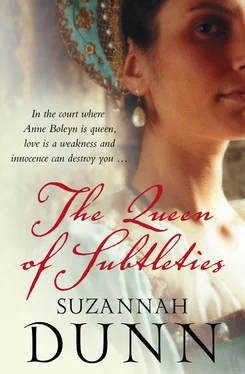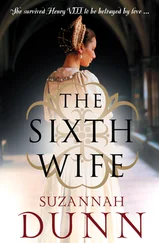Mark sidles in but stays close to the door, leans back against the wall; hoping, I imagine, to be inconspicuous. Summertime has barely touched him, he’s as pale as ever, but the heat in here is bringing a glow to his face. ‘Well,’ he says to me, ‘I’ve caught up with you.’
Does he mean that one of us has been remiss? Which of us, though? It can’t have been me: I can’t rove around inside the various palaces, looking for him. I find myself stating the obvious: ‘We’ve been on progress.’ But has he? Has he been on progress, for the whole time? Has he been in all the places I’ve been, these past three or four weeks? Nonsuch, yes: we did meet up at Nonsuch. But the others? Does the king always take all his musicians with him? If not all, does he take his favourites?
‘I’ve been lucky enough to have a couple of quick breaks,’ he says.
‘For us, it’s been relentless. Poor Joseph—our pack-man: all this to pack up, every few days.’ I’m babbling, but it’s also true: I do feel for Joseph. It’s bad enough for him in the winters, moving us between the major palaces every few weeks, but at least those kitchens are basically equipped. These moves to the smaller houses, the hunting lodges, require us to take everything, every last pan and spoon. ‘And lately, he’s had to deal with all these subtleties, in pieces; packing them so carefully into chests.’
I don’t understand it: every previous summer, there’ve been occasions when we’ve been paid our retainers and told to stay behind in whichever palace we’re in while it’s being cleaned. Time off is welcome, of course, but I can never help thinking of the hard work going on around us: Mr Wilkinson, in his trademark red coat, cleaning the kitchen drains. Worse, beneath us: Poor Mr Long and his poor boys, the gong scourers, digging down alongside the latrine pits, removing bricks and climbing in to take away the mess and scrub the shafts and walls and floors.
Whether or not Richard and I go on progress depends, presumably, on the hospitality offered to the king. Perhaps, sometimes, it’d be a snub to take us. Perhaps sometimes a snub not to. I don’t know the niceties, but someone does. It’s the Knight Harbinger’s job to know if we’re going or not, to arrange accommodation for us if we need it. We simply follow the orders that filter down. But this summer has been different. No niceties. Everywhere the king has gone, we’ve gone, too. Our only orders have been to produce more, and bigger, and better.
I try to be positive. ‘Nonsuch, though: that was lovely, wasn’t it.’ Brand new Nonsuch.
‘Queen Anne’s, now, of course,’ he says. ‘Given to her by the king.’
I don’t care whose it is. ‘Not the house, particularly; but the orchards. I don’t suppose you went into the orchards? Then you’ll not have seen these.’ I take one from the basket and approach him, offering it up for inspection. He brushes a fingertip over the small fruit; it stirs on my palm.
‘What is it?’ he asks. ‘Some kind of baby peach? A funny, little…smooth, little…egg-yolk-coloured peach?’ He gives up with a half-laugh, but remains intrigued.
‘It’s an apricot. Mr Harris—the king’s fruiterer—brought a cutting back from abroad, a couple of years ago, and he’s been nursing it at Nonsuch. And here we are.’
Despite the note of triumph, I suddenly feel silly. Because it’s nothing, really, is it. It’s a fruit; it’s a bit like a peach. I’ve been carried away by all the excitement: Mr Harris’s, and then my own and Richard’s. Why on earth would Mark be interested? And yet. It also is something, isn’t it? It is something : it’s new, it’s alive, and we’ve never seen it before, and isn’t that something?
He’s asking, ‘What are you going to do with it?’ He’s watchful as I replace it with the others.
‘Same as I do with every other fruit. Same as I’m doing over there with the peaches. Cook them. Preserve them. Cook a very thick jam, cut it into pieces, stamp each piece and dust it with sugar.’
‘No one’ll eat them fresh?’
I’m back to the peaches; my knife-blade drops through slick flesh. ‘Fresh fruit’s indigestible, Mark.’ He should know that; should look after himself. ‘It stews in your stomach.’ No wonder he looks so pale.
‘Seems a shame, though. To cook them.’ I can barely hear him over the raps of my knife. ‘To mush them up. When they’re so beautiful.’
A glance, and there they are: nestled in the bowl, but each one also very itself. Staring me down. Looking either helpless, or supremely confident; I can’t decide which. ‘But they have to be eaten. That’s what they’re for. ’
‘Well, I suppose you can model them in sugar. That way, you can keep them intact.’
On the shelves above me are box-loads of lemons and oranges that Richard and I have cast and coloured for the coming feast. Point taken: I know very well that fruits aren’t just for eating, but also for looking at. Of course I do. Much of my time is taken with preserving them or faking them in sugar and marchepane. I can’t have him thinking that I don’t find the apricots beautiful. The first one I ever saw was sunset-coloured; it was bowed by its cleft, and the skin was a blur however sharply I focused.
‘Simple pleasures,’ he says, ‘in these difficult times. These dark times.’
I could ignore that; I could let it pass in respectful silence. Could I? No. No, of course not. He’s right: if it isn’t acknowledged—what’s happened—then it waits to be acknowledged. My problem is with Richard: I really don’t wish to discuss it with or in front of Richard, who’s been so very keen to discuss it with me. Keen to subject me to gossip, to make me hear the details. I don’t even want to think about it. There’s no point; there’s nothing I can do. Except think about it. And I can’t bear to think about it. Mark and I didn’t talk about it at Nonsuch; we could’ve done—everyone else was—but we didn’t. By mutual consent, I presumed. Because what would we have said? If we weren’t going to talk about it like everyone else was—the gossip, the details—then what would we have said? We’d have ended up saying something pointless like, The Tyburn executions—what an awful business! But now something more has happened—it’s happened to Bishop Fisher—and something will have to be said. What, though?
I say, ‘She put him up to it.’ Well, it’s the truth.
‘Not true, Lucy.’ He was ready for me, his response immediate. His head is tilted to one side, appraising me. ‘It’s the king who signs.’
‘Yes, I do know who signs death warrants. As I say, she put him up to it.’ Actually, I can’t quite believe what I’ve said. Oh, I believe in what I’ve said; just can’t believe that I said it, and like that. To Mark.
Richard downs tools: the whispered clink of some utensil.
‘Lucy…’ Mark looks pained, now; the tilted-head coolness is gone.
‘He wouldn’t have done it, otherwise, would he. A traitor’s death for Bishop Fisher? Maybe— maybe —the Tyburn men were traitors. Everyone says they were bookish, religious men, but maybe they did deserve to be hanged, drawn and quartered in front of that audience of male Boleyns and Boleyn-friends. If anyone ever does deserve to be butchered.’
Richard says, ‘Lucy…’ warning me that, in theory, I could join them for saying so.
‘But Bishop Fisher, Mark? Because he wouldn’t sign a piece of paper? Wouldn’t sign his support for Princess Elizabeth as heir, rather than Princess Mary? No protest. No incitement to others. Just a missing signature from an old man. A man of the Church. And there’s Sir Thomas More.’
Читать дальше












